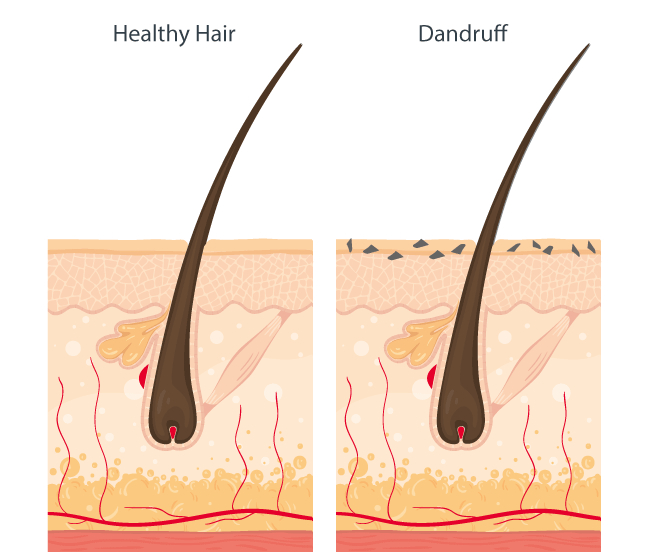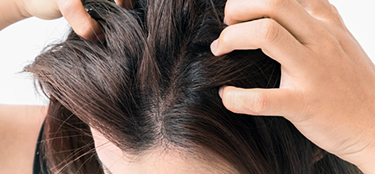Itchy Scalp
An itchy scalp, hair flakes, and sores on the scalp are all symptoms caused by dandruff. This condition occurs when the scalp becomes too dry or too oily. The scalp then produces white flakes of dead skin that accumulate in the hair and fall onto the shoulders. While the appearance of white flakes on clothing is disturbing in itself, a red itchy scalp can be particularly unpleasant. This creates a vicious cycle as the itchiness leads to scratching, which can irritate the skin further, causing a scalp rash or even sores.
Dandruff may be harmless in most cases, but it can have a significant effect on self-esteem. Particularly stubborn dandruff could also be a sign of an underlying condition.

We lose dead skin cells every day as part of the skin’s natural renewal process.
Skin cells start out at the deepest layer of the epidermis (the skin’s outer layer) and mature as they move up to the surface. When they reach the uppermost layer of the epidermis they are shed as flakes of dead skin. These flakes are ordinarily invisible to the naked eye unless they form clumps, which is the case with dandruff.
This excessive shedding of dead skin in turn causes an itchy sensation on the scalp. This of course leads to scratching, causing inflammation and small abrasions and potentially bacterial infection, which can exasperate the condition even more.
Approximately 50% of people worldwide will experience dandruff at some point in their lives.
There are two main types of dandruff. Dry dandruff is usually preceded by a predisposition to dry skin and can be caused by using heat or harsh products on the hair. Oily dandruff is caused by an overproduction of the yeast Malassezia, which is naturally present on most adult scalps. This can trigger increased sebum production, leading to oily dandruff. Oily dandruff can be recognized by larger flakes than dry dandruff and yellowish colour. Additionally, the following conditions could cause dandruff and require medical consultation:
- Atopic eczema (neurodermatitis), a condition associated with red, itchy skin that is extremely dry.
- Contact dermatitis, which describes an allergic reaction to cosmetics or hair care products, could also trigger dandruff symptoms.
- Finally, seborrheic eczema can lead to severe itching and affect the face as well as the scalp.
Many cases of dandruff can be treated using specially formulated hair care products and preparations or by avoiding products or habits that irritate the scalp.
If your dandruff symptoms are the result of an underlying medical condition, you should seek help from a medical specialist.
Can dandruff cause hair loss?
Dandruff itself does not cause hair loss. However, excessive scratching of the scalp to relieve itchiness could weaken the roots of the hair and cause the hair to fall out. Furthermore, the resulting inflammation and accumulation of sebum produced by the hair for protection could block the follicles inhibiting hair growth and resulting in thinning and hair loss.


